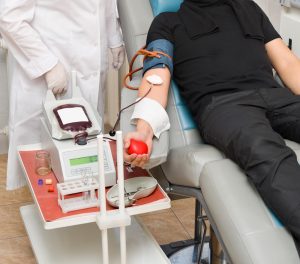 In April, a Twitter post went viral, having men (and even women) even more concerned about their health, specifically their hormonal and sexual health.
In April, a Twitter post went viral, having men (and even women) even more concerned about their health, specifically their hormonal and sexual health.
This post claimed that testosterone levels have dropped by almost 50% during the past 20 years. Fifty percent? Yowza! That’s a lot! Could this be true? That would mean that we have A LOT of sick men out there who are probably experiencing infertility and erectile dysfunction. Could this be why infertility is on the rise?
This is what the same post said:
Here’s a cheery Friday fact: An average 22 year-old (sic) male today has roughly the same testosterone levels as a 67 year old (sic) had in the year 2000. Average testosterone has fallen close to 50% in the last 2 decades, and nobody is talking about it.
Reading that would get anyone at least a little concerned and maybe scared for their health. This post was shared all over social media, so it got around, and many people read it. But is this Twitter user spreading the truth? Or a total lie?
 Medical Doctors Say That Testosterone Levels Have Fallen
Medical Doctors Say That Testosterone Levels Have Fallen
Doctors admit that testosterone levels have fallen recently. However, the rate is lower than 50%. It’s best to understand where the information is coming from before jumping to conclusions – this is a random Twitter post.
Anyone can write anything on Twitter, for the most part. The first part of this Tweet came from the website American Greatness, in an article from 2021:
As we crossed into the new millennium, the average American male had a total testosterone reading of 605 nanograms per deciliter. A scant 20 years later, and the average level has plummeted by 27 percent to just 450 ng/dL. That means the average 22-year-old man today has an average testosterone level roughly equal to that of a 67-year-old in 2000.
The data this article used is from scientific studies published in 2007 and 2021 that were taking samples of testosterone from men in the United States.
These studies saw significant reductions in the male hormone over specific time periods. In the 2007 study, the hormone decreased by 22% when comparing levels from 1985-1987 to 2002-2004. The 2021 study saw a 25% decrease between 1999 and 2016.
 Dr. Ranjith Ramasamy weighed in on the dilemma. He is a urologist at the Miami University Miller School of Medicine and an author of the 2021 study (so he certainly knows his stuff!).
Dr. Ranjith Ramasamy weighed in on the dilemma. He is a urologist at the Miami University Miller School of Medicine and an author of the 2021 study (so he certainly knows his stuff!).
He says, “Neither of these studies assessed men over the last two decades, and the percent change was not close to 50%, so it is inaccurate to say that average testosterone has fallen almost 50% over the last 2 decades.”
Most likely, the 50% number came from adding 25 to 22, the percentages from the two studies but this is not scientifically accurate since there is a possibility of overlap between participants in both of the studies.
Also, if you add the two studies, it spans three decades and not two.
Obesity is a Major Concern for Testosterone Levels
Dr. Ramasamy states that the increasing obesity epidemic and changes in measurement methods are two possible explanations for the changes.
He states: “I think we should be worried about increasing prevalence of obesity, metabolic syndrome and diabetes combined with a sedentary lifestyle—all of which can contribute to testosterone deficiency.”
 In conclusion, this statement is partly false. It is true that testosterone levels have dropped in recent years, but not by 50%.
In conclusion, this statement is partly false. It is true that testosterone levels have dropped in recent years, but not by 50%.
Adding the results of these two studies together is not possible and is not giving us true numbers we can work with.
However, obesity and testosterone deficiency is on the rise in the United States. Consider getting yourself tested for testosterone and, even better, a full comprehensive metabolic panel.
As you get older, you need to pay attention to your hormones and your health. Contact us to get started!
Contact Us Today For A Free Consultation

- Cano's spokeswoman was client of Biogenesis [Last Updated On: January 25th, 2024] [Originally Added On: May 4th, 2013]
- Documents: Cano associate was client of clinic [Last Updated On: January 25th, 2024] [Originally Added On: May 4th, 2013]
- Sources: Cano associate was Biogenesis client [Last Updated On: January 25th, 2024] [Originally Added On: May 4th, 2013]
- Early Stage Testicular Cancer - Surveillance Is Best Follow-Up Strategy [Last Updated On: January 25th, 2024] [Originally Added On: May 18th, 2013]
- 2013 Endocrine Function Testing Market in Europe: Hospitals, Commercial Labs, Physician Offices, Ambulatory Care Centers [Last Updated On: January 25th, 2024] [Originally Added On: June 14th, 2013]
- Europe Endocrine Function Testing Market Studied by VPG in Cutting-Edge Report Now Available at MarketPublishers.com [Last Updated On: January 25th, 2024] [Originally Added On: June 18th, 2013]
- A More 'Natural' Version Of IVF Proves A Success [Last Updated On: January 25th, 2024] [Originally Added On: June 19th, 2013]
- Weight Loss Cure with Metabolic Cookbook - Video [Last Updated On: January 25th, 2024] [Originally Added On: July 12th, 2013]
- Weight Loss Drops - Are They A Scam? - Video [Last Updated On: January 25th, 2024] [Originally Added On: July 12th, 2013]
- Abbott Features Solutions to Help Labs Prepare for the Evolving Healthcare Landscape at the American Association for ... [Last Updated On: January 25th, 2024] [Originally Added On: July 30th, 2013]
- How Testicular Cancer Is Diagnosed | Testicular Cancer - Video [Last Updated On: January 25th, 2024] [Originally Added On: August 11th, 2013]
- 2014 Opportunities in the US Clinical Chemistry and Immunodiagnostics Markets [Last Updated On: January 25th, 2024] [Originally Added On: September 27th, 2013]
- Serie A - Doping ban overturned on cancer sufferer Acerbi [Last Updated On: January 25th, 2024] [Originally Added On: January 8th, 2014]
- Health Highlights: Jan. 8, 2014 [Last Updated On: January 25th, 2024] [Originally Added On: January 8th, 2014]
- Testosterone Replacement Therapy [Last Updated On: December 9th, 2023] [Originally Added On: January 19th, 2014]
- Paid Hepatitis C Clinical Trial Now Enrolling at Avail Clinical Research near Orlando, Florida; Accepting M/F Patients ... [Last Updated On: January 25th, 2024] [Originally Added On: January 22nd, 2014]
- Luteal Phase: The Uterine Lining Phase - Video [Last Updated On: January 25th, 2024] [Originally Added On: April 10th, 2014]
- Doping case against Acerbi dismissed [Last Updated On: January 25th, 2024] [Originally Added On: April 15th, 2014]
- Drugs that Cause Gynecomastia [Last Updated On: January 25th, 2024] [Originally Added On: May 14th, 2014]
- Illegal Online Meds Targeted in Worldwide Crackdown, FDA Says [Last Updated On: January 25th, 2024] [Originally Added On: May 24th, 2014]
- Biogenesis' Bosch surrenders in PEDs case [Last Updated On: January 25th, 2024] [Originally Added On: August 5th, 2014]
- Duchess of Cambridge 'hugely disappointed' after being forced to pull out of yet another engagement due to morning ... [Last Updated On: January 25th, 2024] [Originally Added On: October 1st, 2014]
- Kate, Duchess of Cambridge dazzles in baby blue gown at the Natural History Museum [Last Updated On: January 25th, 2024] [Originally Added On: October 22nd, 2014]
- 'They're poisoning us'. How religious leaders are hindering vaccination programmes across the world [Last Updated On: January 25th, 2024] [Originally Added On: November 14th, 2014]
- Poor prognosis germ-cell tumours are only cured in about half of patients. We aimed to assess whether treatment ... [Last Updated On: January 25th, 2024] [Originally Added On: November 23rd, 2014]
- Nursing a Grudge [Last Updated On: January 25th, 2024] [Originally Added On: January 22nd, 2015]
- Hormone Levels in Men - Testosterone Injections [Last Updated On: November 30th, 2021] [Originally Added On: September 9th, 2016]
- Human Growth Hormone May Actually IMPROVE Quadricep Strength After Reconstruction of Torn ACL [Last Updated On: September 23rd, 2024] [Originally Added On: June 22nd, 2020]
- Six Ways to Feel Good and Balance Your Hormones at the Same Time! [Last Updated On: January 25th, 2024] [Originally Added On: September 24th, 2020]
- Your Birthplace Heavily Influences Your Future Testosterone Levels [Last Updated On: August 19th, 2024] [Originally Added On: March 6th, 2021]
- Both High and Low Levels of Testosterone Correlate With Cardiovascular Issues in Men [Last Updated On: September 27th, 2024] [Originally Added On: April 14th, 2021]
- Breaking News: Testosterone May Be the Answer to Autoimmune Diseases [Last Updated On: August 24th, 2024] [Originally Added On: May 14th, 2021]
- Non-Stop Cravings for Protein? Blame it on Your Gut Hormones! [Last Updated On: September 13th, 2024] [Originally Added On: May 21st, 2021]
- Testosterone Therapy Could Help Quell Your Asthma Attacks [Last Updated On: September 12th, 2024] [Originally Added On: June 20th, 2021]
- BPA Here, BPA There, What’s the Reason for the Scare? [Last Updated On: September 16th, 2024] [Originally Added On: June 29th, 2021]
- Low Testosterone Linked to Depression and Suicidal Ideation [Last Updated On: August 25th, 2024] [Originally Added On: July 5th, 2021]
- It’s True: Men Today Have Less Testosterone Compared to Men a Generation Ago [Last Updated On: September 19th, 2024] [Originally Added On: July 13th, 2021]
- Losing Weight with Baratric Surgery Reverses Low Testosterone [Last Updated On: October 2nd, 2024] [Originally Added On: February 8th, 2022]
- Do Larger Testicles Make More Testosterone? [Last Updated On: July 24th, 2024] [Originally Added On: May 3rd, 2022]
- Another Analysis Shows No Cardiovascular Risks With Testosterone Therapy [Last Updated On: October 6th, 2024] [Originally Added On: November 27th, 2022]
Word Count: 626




















